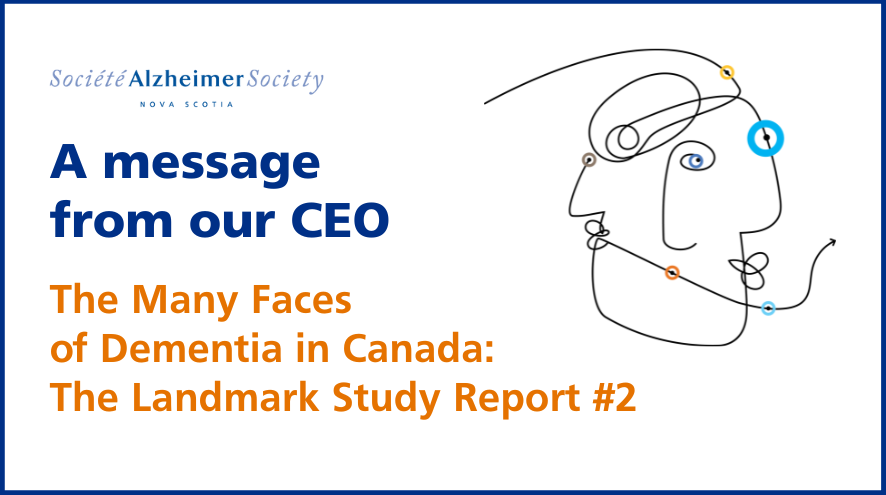A message from our CEO: The Many Faces of Dementia in Canada
On January 22, the Alzheimer Society of Canada released a new report, The Landmark Study: The Many Faces of Dementia in Canada. This is the second of three volumes of the study which details the demographic, social and economic impact of dementia in Canada. Volume three is expected to be released later this year.

On January 22, the Alzheimer Society of Canada released a new report, The Landmark Study: The Many Faces of Dementia in Canada. This is the second of three volumes of the study which details the demographic, social and economic impact of dementia in Canada. Volume three is expected to be released later this year.
This is one of the first Canadian studies that projects the demographics of people living with dementia. The study seeks to better understand the many faces of dementia and find equitable solutions for future dementia challenges, so that no one is left behind. We’re pleased to have had our board member, Dr. Melissa Andrew, engaged as an expert reviewer.
This report is divided into four main categories:
- Dementia and Indigenous Peoples
- Ethnic and Racial Diversity of People Affected by Dementia
- Sex and Gender Differences in Dementia
- Young Onset Dementia: Distinct Challenges
In Nova Scotia, the number of people living with dementia with Asian, Indigenous and African ancestry will disproportionately increase over the next 30 years – approximately 700%, 200% and 100% respectively, compared to 87% in the general population.
This study brings an intersectional lens to the experience of people affected by dementia. It demonstrates how healthcare inequities are shaping the demographics of people with dementia.
Culturally appropriate and safe care is key to addressing the health inequities and barriers that currently exist. It’s essential that inclusion, diversity, equity and accessibility are an integral part of the approach to dementia risk reduction, care, and support.
The key message of the report is that there are factors unique to each individual that directly affect the incidence, prevalence, risk, presentation and experience of dementia. These nuances must be considered across all aspects of healthcare and support interventions, with a specific commitment to increasing equitable access to support.
For our part at the Alzheimer Society of Nova Scotia, we remain committed to the expansion of our work as it relates to inclusion, diversity, equity, and accessibility (I.D.E.A). Over the past several years we have:
- Created a new full time staff position to work directly with African Nova Scotians to engage the communities and provide culturally relevant services
- Developed culturally relevant materials for the African Nova Scotian community
- Held education sessions for the Arabic community through community partners ISANS and Veith House
- Invested in ongoing I.D.E.A. training for our staff team
- Started collecting demographic data from our clients to better serve them
- Became a CCDI Employer Partner and integrated I.D.E.A. into HR processes
- Implemented a policy of including Indigenous land acknowledgements in all of our events and presentations
- Developed culturally relevant materials about dementia for Indigenous communities
- Invited to the Atlantic First Nations Skills Sessions to provide materials and connect with Indigenous healthcare workers
- Participated in Pride events throughout Nova Scotia
“Our community partners like HAAC, ISANS, Réseau Santé, and many Indigenous professionals and community members have supported our work in creating culturally relevant and safe programs and services for present and future clients,” says Kirstie Creighton, our Manager of Education & Belonging.
We welcome the evidence-based data and recommendations contained in this report. We are ready to champion these recommendations in our work with these communities, government, researchers, and healthcare partners.
Additionally, we will continue to expand our commitments and investments in this area by considering the evolving needs in our programs, services and operations. We remain committed to ensuring that ALL Nova Scotians affected by dementia feel supported and a sense of belonging with the Society.
If you see yourself in this report, or are a community organization or healthcare provider and have suggestions on how we can better support you and your community, we invite you to contact us by email at alzheimer@asns.ca or phone at 1-800-611-6345.
Find the full report and a provincial data sheet here.
